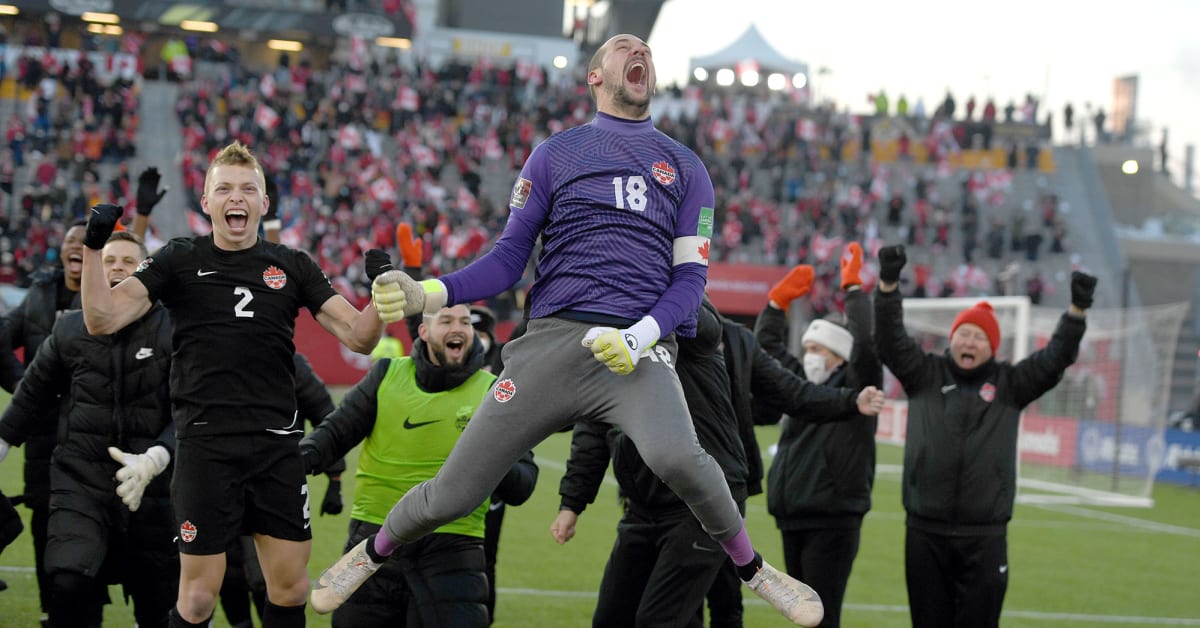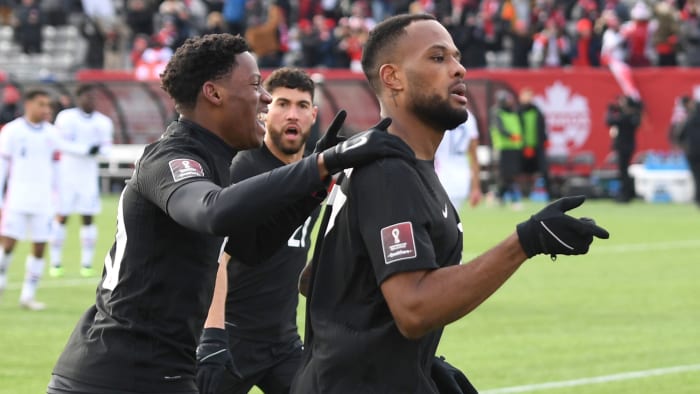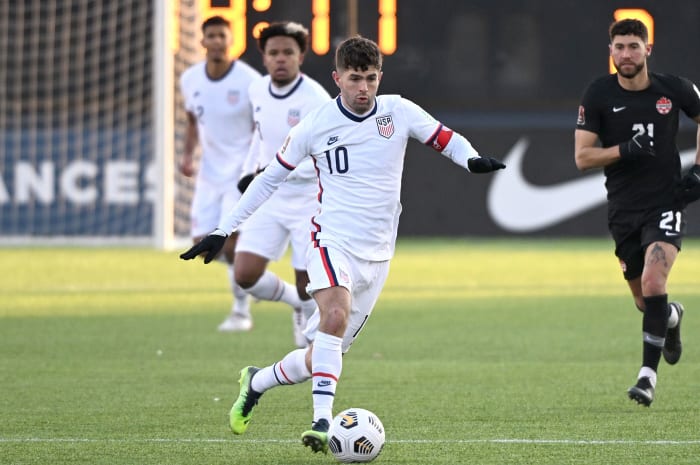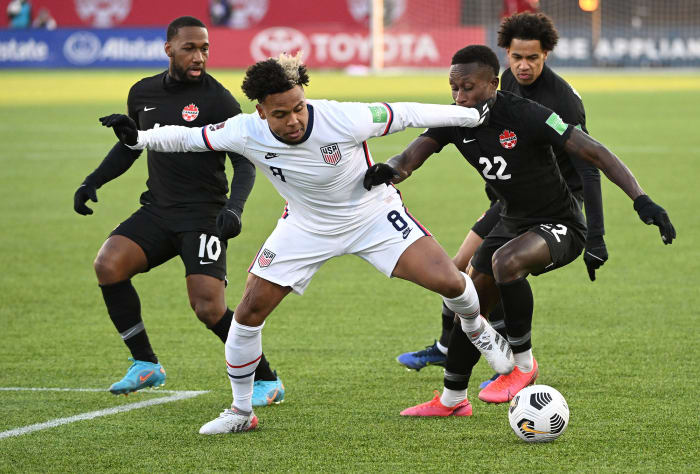Canada’s Continued Rise Should Look Familiar to USMNT
Concacaf history may be repeating itself, and Sunday afternoon’s World Cup qualifier in Hamilton, Ontario, offered an ironic glimpse into a power structure that appears to be evolving again in real time.
Forty years ago, it was Mexico, the unquestioned regional power, that had to contend with a vigorous challenge from an upstart to the north. Lacking El Tri’s pedigree and polish, the nascent U.S. men’s national team compensated with vigor, efficiency and an exhausting commitment to be difficult to play and defeat. Over time, it worked, and an American soccer culture took root. The two countries now are essentially equals, at least on the national team level, and have been trading blows and titles for decades. In many ways, Mexico is still coming to terms with the loss of its permanent place at the Concacaf summit.
Now Canada, a country that hadn’t even advanced to the final round of World Cup qualifying since the late 1990s, is writing a similarly stunning script. While the U.S. has received the plaudits, press and attention for its growing young core of talented athletes, its UEFA Champions League players, its high-profile transfers and its Gold Cup and Nations League winners, Canada has been forging a steely, collective identity. While U.S. coach Gregg Berhalter tries to instill an ambitious and proactive style of play, leaving behind the reductive soccer that once was the program’s hallmark, Canada’s John Herdman has focused on consistency, cohesion and mastering the basics—playing mistake-free soccer and contesting a game on his team’s terms.
Hamilton is the traditional home of Canadian steel production, and on Sunday, its national team reflected that solidity and strength. One team passed, moved and passed some more. The other refused to break, then made the plays that won the game. Canada’s deserved 2–0 triumph wasn’t a fair reflection of the possession stats or of the visitors’ commitment to attack. Instead, it was a reflection of the home team’s old school defensive discipline and mastery of the moments that mattered.
Canada (6-0-4) has earned qualifying points in the U.S. and Mexico, and it’s now defeated both traditional powers on home soil. It’s clearly earned its spot atop the Octagonal standings and could all but seal its first World Cup invite in 36 years when the qualifying window closes next Wednesday. The U.S. (5-2-3), meanwhile, has a huge game coming up against Honduras in frigid St. Paul, Minn. With treacherous trips to Mexico and Costa Rica scheduled for March, the Americans’ margin for error is almost gone. The top three Octagonal finishers will advance to this year’s World Cup and the fourth-place side will head to a one-game intercontinental playoff
“Our focus right now is finishing off the window with a win against [Honduras], which we know is easier said than done,” Berhalter said. “But that's going to be our goal. That’s going to be our focus. If can do that, we'll be in good position. And then it's about going into the last window and getting results. And we’re confident we have a team that can do that.”
Berhalter’s confidence is borne from a couple years of solid development, two recent trophies and his players’ obvious talent. He wasn’t shaken by Sunday’s final score, and was borderline defiant when assessing the game’s ebb and flow.
"We asked them to be dominant. We asked them to embrace the conditions, embrace the physicality of the opponent. And I think we did that and more,” he said. “It’s hard for me to remember a performance away from home this dominant without getting a result. So, the result hurts. The performance doesn't hurt.”
Berhalter played to win at Tim Hortons Field, where the temperature was about 25 degrees at kickoff. In the Octagonal’s two previous three-game windows, he rotated his squad significantly for the second match on two full days rest. He swapped out six starters ahead of the September tie against Canada in Nashville, and then rotated seven before losing at Panama the following month. On Sunday, however, he changed only three. Right forward Brenden Aaronson started in place of Tim Weah, who wasn’t able to make the trip because of his vaccination status. Striker Gyasi Zardes was deployed up top in place of Jesús Ferreira, and Miles Robinson filled in for Walker Zimmerman (hamstring) at center back.
Canada’s roster concerns were more pressing. Its top player, and perhaps the brightest star in Concacaf, Bayern Munich left back Alphonso Davies, is out with post-COVID-19 myocarditis. Influential Porto midfielder Stephen Eustáquio was missing with COVID-19 concerns as well. No matter. This is an old-fashioned side that plays better than the perceived value of its parts. It’s also a team whose strikers are a strength. While the conveyor belt supplying the U.S. with young talent has yet to produce a reliable finisher (Ricardo Pepi is 19 and a work in progress), Canada’s Jonathan David and Cyle Larin lead the Octagonal in scoring and are as mature and ruthless as they come in the region. They changed the game in the seventh minute.
U.S. goalkeeper Matt Turner took a poor goal kick into the wind, and a long Canadian header put the ball right back into the heart of a defense that wasn’t sufficiently compact. A quick exchange between Larin and David sent the former past a flailing Robinson, and Turner failed to reach Larin’s shot toward the left post.
“I don't think they dominated much of anything tonight, to be honest, but give them a lot of credit for the resiliency. And one thing that separates Canada from from most of the other teams in the group is the quality of their strikers and their ability to finish a really small amount of chances,” Berhalter explained.
“They deserve credit for what they've been doing. They’ve been resilient all qualifying window. They’re leading the group for a reason. Finishing off that first one is a great example,” he added.
Larin’s effectiveness stood in winning contrast to the visitors’ wastefulness. The U.S. enjoyed 64% of possession and won the midfield battle but, like their first encounter in Nashville, had no answers for a Canadian side content to withdraw and counter. The Americans' recognition of opportunities to attack in transition was slow, and passes into the penalty area were too frequently blocked or inaccurate. Christian Pulisic often drifted toward the middle rather than trying to stretch the Canadians on a narrow field, and the U.S. put a meager three shots on target.
Weston McKennie had the Americans’ best scoring chance, but his first-half header off a Pulisic corner kick was brilliantly saved by Canada’s Milan Borjan, who reached high with his right hand to nudge the ball off the crossbar. Aaronson had the best look of the second half, but he failed to take advantage of a nice feed from McKennie and sent his bid straight at the goalkeeper. Substitute Paul Arriola then came close with an audacious bicycle kick in the closing moments. While the U.S. was willing to try anything, it was Canada that was uncomplicated and productive. Sam Adekugbe, an England-born, Vancouver Whitecaps product who now plays in Turkey, provided the exclamation point with a strong, stoppage-time run down the U.S. center and a pinpoint finish past Turner. It was his first international goal.
“I don't think we created that that many clear-cut chances that we should have finished off. So, I don't think today was an issue of poor finishing. … I think it was more of lack of chance creation that I think got us down a little bit, a lack of precision in the final third,” Berhalter said.
He added, “Overall, when we talked about what we needed to do to win this game, we checked almost all the boxes. And that I'm pleased with.”
It’s easy to imagine the coaches who faced the U.S. in the ‘90s and early 2000s saying similar, wondering how they were beaten by a less-heralded squad that had little of the ball yet always seemed to be in some sort of command. The Canadians were rarely threatened in Hamilton. They appeared to have the Americans right where they wanted them, even when the U.S. was on the front foot. Soccer has a habit of separating style from the final score, and teams like Canada have a habit of amplifying that phenomenon.
“We’re living the dream. Through the hard work and the effort, we’re living a big moment. This country feels like they’re behind us and we’re nearly there. It feels like we're a football country,” Herdman said. "That’s what this is all about, team spirit. We’ll never stop fighting and we’ve got a football nation behind us now.”
Turner said, "Credit to my teammates for fighting for 90-plus minutes. We just couldn’t get the goal. ... I think we can take a lot of positives from this game. But at the same time, points count for more than moral victories.”
The U.S. now needs points. Berhalter will have little choice but to rotate more of his squad against Honduras. McKennie, Pulisic, Yunus Musah, Sergiño Dest and Antonee Robinson are among the key men who started two qualifiers in four days. And Berhalter may be without midfield linchpin Tyler Adams, who left Sunday’s game with a hamstring issue, and center back Chris Richards, who suffered a foot injury. Wednesday’s game in Minnesota isn’t mathematically a must-win—the U.S. still is in shape to finish at least fourth—but in practical terms, it is. Perhaps that desperation will help the Americans rediscover the qualities that helped change the face of Concacaf years ago.
More Soccer Coverage:









